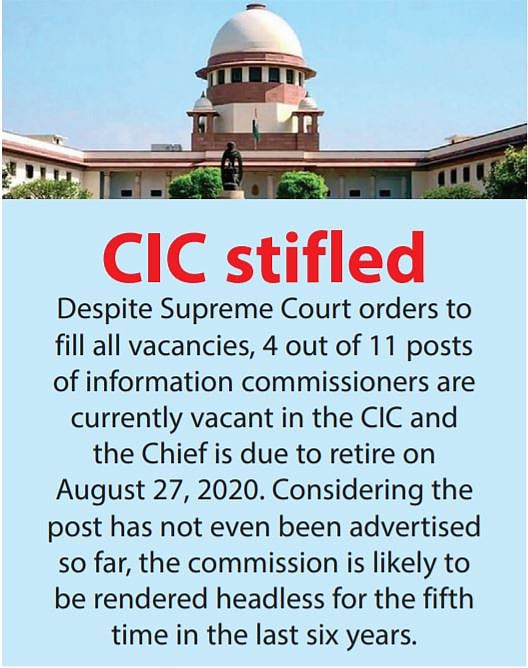Our institutions: Pillars of society, not democracy
Watchdogs have systematically been reduced to a state where they sometimes bark but never bite

Independent, impartial and effective institutions are the guarantors of the rule of law on which a democratic republic is founded. Robust institutions ensure that the rule of law is not overwhelmed by the weight of numbers in a democracy. They protect citizens against the arbitrary use of power by the state and its functionaries.
As India enters the 74th year of its Independence, perhaps the biggest challenge faced by the republic is the imminent collapse of its institutions of oversight.
Judiciary: Recent developments have exposed deep faultlines in the Indian judiciary. The unprecedented press conference addressed by four senior judges of the Supreme Court in January 2018 was apparently triggered by the arbitrary allocation of benches by Chief Justices, with cases being ‘selectively’ assigned to particular judges to obtain particular outcomes.
The allegations raised serious doubts about the Independence of the judiciary, given that nearly 70 per cent of litigation involves the government. These doubts have been further exacerbated by the handling of several politically sensitive cases by the apex court including the electoral bonds matter, Rafale deal case, habeas corpus petitions of Kashmir and constitutionality of the Citizenship (Amendment) Act.
In the last six years, the process of judicial appointments has been stalled in several cases by the executive not notifying the appointment of judges recommended by the collegium, even when recommendations were reiterated. This is contrary to the settled law on judicial appointments and has an adverse impact on the Independence of the judiciary.
Unfortunately, many chief justices have not pushed the matter with the government, giving rise to speculation that it might be due to the lure of post-retirement jobs or the result of the executive pressurising them through the use of investigative agencies.
The reluctance of the judiciary to set up a robust and credible system to look into allegations of misconduct by judges has seriously eroded public trust in the institution. Immediately after allegations of sexual harassment surfaced against the Chief Justice of India (CJI) in April 2019, the CJI presided over a hearing in which he himself was a party, flouting the fundamental principle that no one should be a judge in their own cause. In 2017 when allegations of financial corruption surfaced against the then CJI in the medical college bribery case, the matter was similarly dismissed with little regard for established procedures and principles.
An important indicator of the health of any institution is its ability to respond to criticism about itself and undertake necessary reforms. The apex court did not cover itself in glory when, in response to tweets by senior human rights lawyer Prashant Bhushan criticising the functioning of the Court and alleging corruption in the judiciary, it initiated suo-motu contempt proceedings against the him.

Information Commissions: There have been consistent attacks on the institution of information commissions, which are critical for proper implementation of the RTI Act - a law which has empowered people to hold the government to account.
Fixed tenure and high status were conferred on information commissioners under the RTI Act to empower them to carry out their functions autonomously, without fear or favour. In July 2019, despite stiff opposition within and outside Parliament, the government pushed the RTI Amendment Act which defanged the transparency watchdogs. The amendments empowered the central government to make rules to determine the tenure and salaries of all information commissioners in the country - clearly signalling that directions to disclose inconvenient information could invite adverse consequences from the government.
Vacancies in information commissions lead to large backlogs of appeals/complaints and concomitant long delays in the disposal of cases, effectively frustrating people’s right to information. The functioning of commissions has been severely impeded by governments not appointing information commissioners in a timely manner.
The track record of the BJP led central government has been particularly abysmal. Since May 2014, not a single commissioner of the Central Information Commission (CIC) has been appointed without citizens having to approach courts.
Lokpal: The Lokpal law was enacted in January 2014 after a strong public campaign demanding the setting up of an empowered and independent institution to tackle cases of corruption. The chairperson and members of the Lokpal were not appointed till 2019, more than five years after the law was passed.
The manner in which appointments were finally made raised serious questions about the credibility of the selection process. An important principle for ensuring Independence of such bodies is that the selection committee should not have a preponderance of representatives of the government and the ruling party.
Since no one was recognized as the leader of the Opposition in the Lok Sabha after the 2014 elections, the selection committee comprised of Prime Minister Narendra Modi, the Speaker of the Lok Sabha, the CJI and Mukul Rohatgi, who served as attorney general during the BJP regime. The appointment of the chairperson and members of the Lokpal , therefore, came under a cloud with doubts arising about an inherent bias towards the selection of candidates favoured by the government and, therefore, about the ability of the Lokpal to function impartially and independently.
Similar problems have been plaguing the functioning of other institutions in the country. In the last general elections, even the Election Commission was found wanting. Many of its decisions - not taking note of infractions by leaders of the ruling party, disregarding dissent of one of its own in handing out clean chits to the PM - fuelled perception of bias and dented its image in the public mind.
Autonomous and robust institutions are the bedrock of a democracy. Unless they stand as bulwarks against the multiple challenges that threaten our republic today, there is a real danger that peoples’ democratic rights are liable to be trampled with impunity.
Follow us on: Facebook, Twitter, Google News, Instagram
Join our official telegram channel (@nationalherald) and stay updated with the latest headlines
